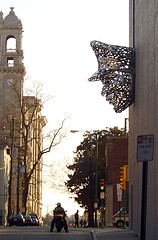Does your school track you on campus?

Two public schools in Texas are testing “smart” ID cards this school year. It is a new method of keeping track of students while at school. The “Student Locator Project” involves a tracking chip added to all student ID cards.
Beginning in the fall of 2012, John Jay High School and Jones Middle School have provided their 4200 students the new “smart” ID cards. It only works while the student is on campus and is designed to improve class attendance and student safety. One reason for keeping students in class is that in Texas school funding is based on attendance. The more students seated in homeroom when the first bell rings, the more state dollars the school receives. Consequently, if the front office can track a student to another location on campus, they’ll be counted as present for the day.

Big Brother is Watching by GetGetFamous (Flickr)
Not all parents support the program. Some see it as an intrusion by government. Others agree that the chip is a smart way to ensure that students are where they should be during the school day.
What do you think of being tracked at school? Is this necessary or do you see it as another Big Brother intrusion into your life? What about the safety factor in knowing where all students are anytime they’re on campus? Is this a legitimate justification for use of the smart-cards? Why or why not?
Update: Andrea Hernandez is a 15-year-old student at one of the schools and is challenging the smart-card. She claims it is against her religion. At a hearing in federal court on December 19, 2012, Andrea testified that wearing the badge would be tantamount to “accepting the Mark of the Beast,” which Revelation predicted the Antichrist would try to make people do. The judge is expected to rule shortly. Her school planned to transfer her to another school in the district that wasn’t using the new ID card and Andrea objects to the transfer.
On January 9, 2013, a federal court ruled in favor of the school district. Since they agreed to remove the chip from Andrea’s ID card, requiring her to wear the ID was not a violation of her religious beliefs. Andrea’s lawyer indicated that an appeal to a higher court would be considered.


